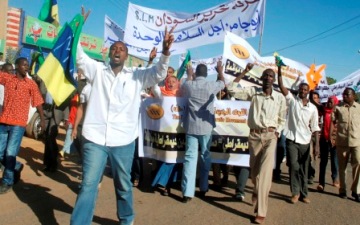Sudan’s parliament allays concerns over anti-espionage law
March 20, 2012 (KHARTOUM) – The Sudanese legislature sought on Tuesday to assuage fears among journalists over an impending anti-espionage bill, saying the move is not intended to curtail media freedoms but to protect homeland security against foreign intelligence activities.

Sudanese journalists and rights activists fear that the new law would exacerbate what they describe as a campaign to intimidate them and further repress media freedom.
They are particularly concerned that the move is aimed at providing a legal framework for the National Intelligence and Security Services (NISS) to crackdown on online dissent.
“The new bill will dedicate NISS focus on social media activists & journalists who are doing so much in terms of campaigning [against the government],” Maha El-Sanosi, a female Sudanese journalist, wrote on twitter.
Another twitter user going by the name NUBYA said “they have just broadened their spider web to include online activity”
To make matters worse, the parliament’s speaker and member of the ruling National Congress Party (NCP), Ahmad Ibrahim Al-Tahir, on Monday warned that journalists who contact rebel groups or cover their activities are committing “high-treason.”
Al-Tahir’s statements, in which he also called for greater immunities to NISS agents, already untouchable under the 2010 National Security Forces Act, stoked concerns that the upcoming law could also be used to target journalists.
But the head of the parliament’s legislation and justice committee, Al-Fadil Haj Suleiman, said in the capital Khartoum on Tuesday that the new law does not seek to limit press freedom. He also said that there is no harm if the press gives coverage to the other opinion.
The purpose of the new law, he explained, is to counter espionage involving foreign sides.
He cited the example of the illegal entry by US congressman, Frank Wolf, and the New York Times’ columnist, Nicholas Kristof, into Sudan’s war-battered region of South Kordofan as the sort of issues that the new law would deal with. According to him, the two US citizens had entered South Kordofan and gathered intelligence from the area without the approval of Sudanese authorities.
Suleiman was also keen to point out that the law is still under consideration and there is no deadline to approve it.
Meanwhile, the chairman of the Sudanese Union of Journalist (SUJ), Mahi-Aldeen Tittawi, announced that he intends to meet with the parliament’s speaker, Ahmad Ibrahim Al-Tahir, in order to receive clarifications on the status of journalists under the anti-espionage law.
The chief of the government-controlled SUJ, however, failed to comment on Al-Tahir’s incrimination of contacts between journalists and rebel groups.
The Sudanese government has long been suspicious of journalists and fears any links between them and foreign groups.
In 2008, former NISS director Salah Gosh accused journalists of being spies for the Western diplomatic community in Sudan. His accusation was followed shortly by the imposition of pre-publication censorship on Sudanese newspapers.
This practice went on for a long time before it was officially abolished last year. But the papers still complain against receiving orders from the NISS to avoid reporting on issues deemed sensitive.
In an interview with Al-Jazzera this week, Sudan’s president Omer Al-Bashir warned journalists and newspapers against publishing any negative comments on the army as it battles insurgents in a number of fronts including South Kordofan, Blue Nile and Darfur.
Sudanese newspapers are already under strict orders by the NISS not to report activities or statements of rebel groups. The NISS suspended the pro-opposition Ra’y al-Sha’b newspaper in January this year after the paper published an interview with a member of the Darfur rebel Justice and Equality Movement.
(ST)
